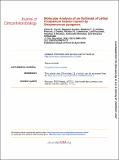Molecular analysis of an outbreak of lethal postpartum sepsis caused by Streptococcus pyogenes
Abstract
Sepsis is now the leading direct cause of maternal death in the United Kingdom, and Streptococcus pyogenes is the leading pathogen. We combined conventional and genomic analyses to define the duration and scale of a lethal outbreak. Two postpartum deaths caused by S. pyogenes occurred within 24 h; one was characterized by bacteremia and shock and the other by hemorrhagic pneumonia. The women gave birth within minutes of each other in the same maternity unit 2 days earlier. Seven additional infections in health care and household contacts were subsequently detected and treated. All cluster-associated S. pyogenes isolates were genotype emm1 and were initially indistinguishable from other United Kingdom emm1 isolates. Sequencing of the virulence gene sic revealed that all outbreak isolates had the same unique sic type. Genome sequencing confirmed that the cluster was caused by a unique S. pyogenes clone. Transmission between patients occurred on a single day and was associated with casual contact only. A single isolate from one patient demonstrated a sequence change in sic consistent with longer infection duration. Transmission to health care workers was traced to single clinical contacts with index cases. The last case was detected 18 days after the first case. Following enhanced surveillance, the outbreak isolate was not detected again. Mutations in bacterial regulatory genes played no detectable role in this outbreak, illustrating the intrinsic ability of emm1 S. pyogenes to spread while retaining virulence. This fast-moving outbreak highlights the potential of S. pyogenes to cause a range of diseases in the puerperium with rapid transmission, underlining the importance of immediate recognition and response by clinical infection and occupational health teams.
Citation
Turner , C E , Dryden , M , Holden , M T G , Davies , F J , Lawrenson , R A , Farzaneh , L , Bentley , S D , Efstratiou , A & Sriskandan , S 2013 , ' Molecular analysis of an outbreak of lethal postpartum sepsis caused by Streptococcus pyogenes ' , Journal of Clinical Microbiology , vol. 51 , no. 7 , pp. 2089-2095 . https://doi.org/10.1128/JCM.00679-13
Publication
Journal of Clinical Microbiology
Status
Peer reviewed
ISSN
0095-1137Type
Journal article
Description
This work was supported by the United Kingdom Clinical Research Collaboration, which funds the National Centre for Infection Prevention and Management at Imperial College London. The work was also supported by The Wellcome Trust (C.E.T., R.A.L., S.D.B., and M.T.G.H.). S.S. is grateful for support from the United Kingdom NIHR Biomedical Research Centre funding scheme.Collections
Items in the St Andrews Research Repository are protected by copyright, with all rights reserved, unless otherwise indicated.

